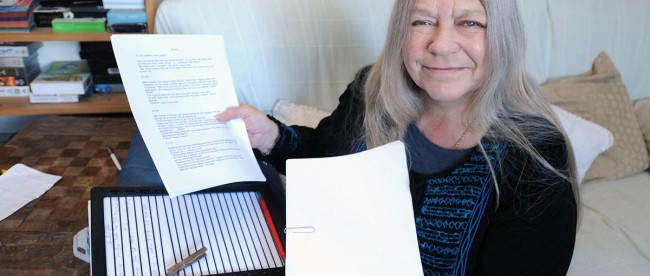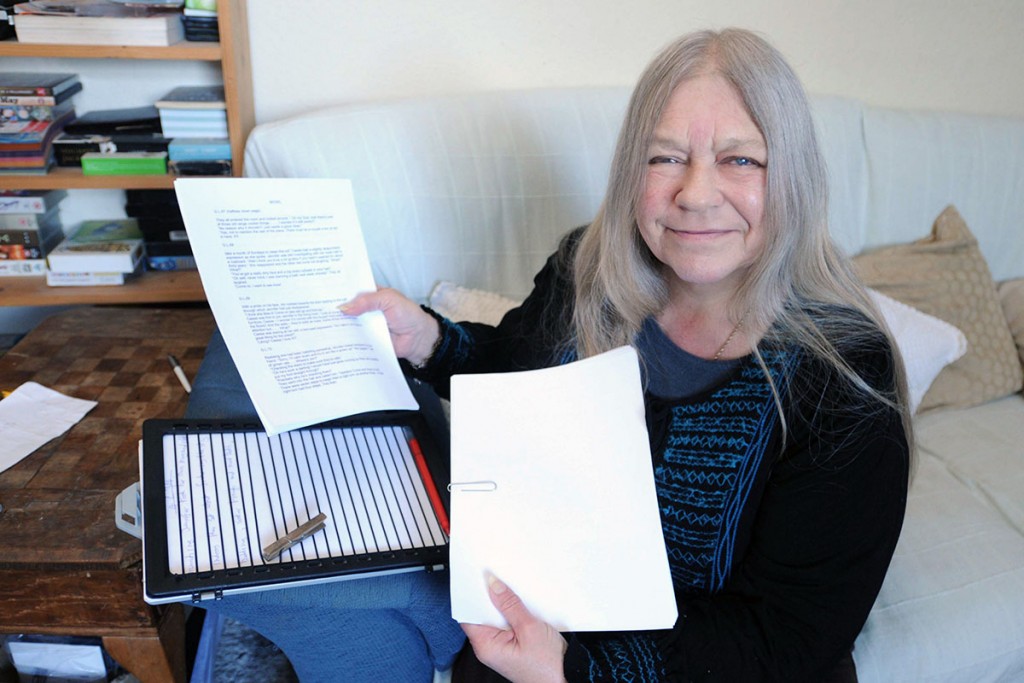Bringing the Invisible to Life

For many, writing a book is a “bucket list” item — something you want to do while you’re still alive to do it. For a Dorset, England woman named Trish Vickers, that was certainly true. In 2010 or 2011, Vickers — then age 59 — decided to pick up a pen and paper and put words to page, much like other aspiring writers would. But Vickers’ story wasn’t the same as others. First, she refused to type her story — she wanted to write her book by hand. And second, she was blind; she lost her sight to diabetes a few years earlier.
But Vickers was dedicated to her dream. As seen below, she used a neat, self-made contraption — paper lined with hand-placed rubber bands — to keep her pen in place and her sentences from meandering off the page.

That solution, though, was not nearly enough for Vickers to finish her story. For her to reach that goal, the police had to get involved.
Vickers’ process was straightforward: she’d write and, once a week, her son Simon would come over to read the story back to her. One day in 2011, Simon showed up, expecting to read 26 new pages that his mother had written. But when he arrived, what he saw was nothing — the pages were blank. Trish Vickers didn’t know it at the time, but the pen she had been using had run out of ink. And when she found out, she was devastated.
Not knowing what else to do, she and Simon called the police. To the Vickers’s surprise, officers at Dorset HQ volunteered to work during their breaks and free time, hoping to use their forensic tools to help. And, five months later, the police reported back with success: they recovered the never-written words. Vickers told a local newspaper that the pen she used to write the pages — even though there was no ink left in it — left behind a series of indentations: “I think they used a combination of various lights at different angles to see if they could get the impression made by my pen.”
Vickers continued writing, authoring a total of 110,000 words. In early 2017, now suffering from a terminal case of cancer, she was able to find a publisher to turn her manuscript into a printed-and-bound book. On March 9, 2017, her publisher, Magic Oxygen, delivered the first edition of the book, “Grannifer’s Legacy.” Ms. Vickers passed away that very same day.
Bonus fact: According to a 2014 study, blind people dream differently than sighted people. As one would perhaps guess, people blind from birth tend not to have very visual dreams, and those who became blind later in life tend to have increasingly less visual dreams as they get older. Other senses become relied upon more, per National Geographic: “almost 70 percent of the blind reported a touch sensation, compared to 45 percent of [non-blind] controls” and “86 percent of the blind reported hearing, compared with 64 percent of controls.” The content of the dreams, though, are otherwise the same, as far as we can tell — with one exception. For reasons science still hasn’t figured out yet, “the blind had a lot more nightmares: around 25 percent, compared with just 7 percent of the later-onset blind group and 6 percent of [sighted group],” summarizes Nat Geo.
From the Archives: Invisible Ink: The pens made by blind workers (and why)
Related: “Grannifer’s Legacy” by Trish Vickers.
